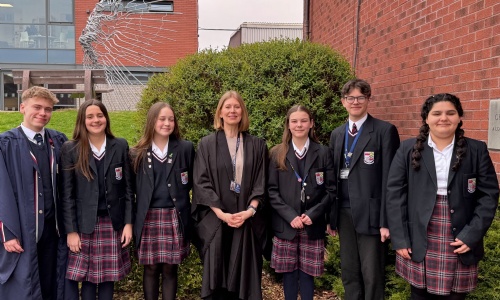Solihull pupils explore the unique strengths found in neurodivergent ways of thinking
Find out more about us

“Championing each person's glorious uniqueness is fundamental to everyone's sense of belonging and central to who we are as a school.” - Mrs Papantoniou, Head of Learning Support
At Solihull, through our expansive Wellbeing and Personal Development curriculum, we work hard to ensure pupils understand and respect each other’s differences, showing kindness and patience to those who might need to work harder to compensate for challenges they experience and actively welcoming different ways of thinking to solve challenges.
During Neurodiversity Celebration Week recently, Head of Learning Support Mrs Papantoniou and a group of pupils from the Senior School Equity Group led a powerful assembly designed to challenge stereotypes about different kinds of neurodivergent thinking and highlight the significant strengths and excellence well known neurodivergent thinkers bring to the worlds of sport, the arts, music, leadership and many other fields.
Introducing the assembly, Mrs Papantoniou said: “Championing each person's glorious uniqueness is fundamental to everyone's sense of belonging and central to who we are as a school. Just as we all have our very own fingerprint, we also have our own unique way of thinking, feeling and being. We are all different and different is good.”
Sixth Form student Ben noted that there is no such thing as a “standard human brain, with every person wired differently and experiencing the world through their own unique way of thinking.” Celebrating neurodiversity, he said, encourages us to “value diverse perspectives - and create environments within school where everyone can thrive and reach their potential, rather than simply focusing on what people find difficult.”
While Attention Deficit Hyperactivity Disorder (ADHD) can make it harder for those with the condition to focus and concentrate, XX ThirdForm pupil Frankie revealed that they can also be highly innovative and creative - bringing energy and new approaches to tasks and projects and becoming experts in their chosen field due to an ability to hyperfocus. She highlighted a wide range of respected public figures who have ADHD, including actors Emma Watson and Ryan Gosling, musician Justin Timberlake and Olympic gymnast Simone Biles Michael Phelps – all of whom attribute ADHD with their drive and determination to succeed in their chosen fields.
Fourth Form pupil Hayden reminded pupils of the importance of not referring to the term Autism in negative terms. People on the autistic spectrum can be good at “absorbing and remembering facts and recognising patterns far better than many of those who are neurotypical,” he said, adding: ‘Many people with autism are exceptionally creative and excel in the arts.”
“The television nature presenter Chris Packham, who talks widely about his autism, says humanity has prospered of people with autistic traits. Without them, he says, we wouldn’t have put a man on the moon or be running software programmes,” noted Hayden.
Reflecting on the challenges experienced by dyslexic thinkers, Eliza in XX Shells Form, noted that about 10% of the population are dyslexic – but this rises to 35% of entrepreneurs because of the unique strengths of dyslexic thinkers in areas such as creativity and problem-solving capabilities.
Dyslexia can cause challenges with reading, writing and spelling and can affect things like processing information quickly, organisation or spelling, but dyslexic thinkers can also offer unique perspectives and excel in seeing the bigger picture, bringing innovation and curiosity to the classroom and workplace.
Explaining more about dyspraxia - a developmental co-ordination disorder – Lucy, in Shells XX Form revealed that it can affect tasks requiring balance and fine motor skills, such as playing sports or using small objects. “However, she continued, “dyspraxic individuals tend to have strengths in creativity, imagination and original thinking. They can excel in strategic & visual thinking. They bring inventiveness and good problem-solving skills as well as a strong eye for detail. Determination, resilience and motivation are high on their skill sets as well as a high level of empathy and patience with others.”
Neurodiversity is an umbrella term that covers a wide variety of other neurological differences – many of which may be less familiar. Third XX Form pupil Juju highlighted several, including Tourette’s Syndrome, Dyscalculia and Dysgraphia, which cause extreme difficulties with numbers and handwriting, as well as Aphantasia, which causes difficulty with visualising mental images such as imagining the face of a friend.
As we work to prepare pupils for their future careers through our FUTURES post-18 pathways programme, it’s important to note that businesses and organisations are now actively seeking diverse thinking in the workplace and so are investing in recruitment strategies to attract neurodivergent applicants. For example, GCHQ (the UK government's intelligence, security and cyber agency) now actively look to hire what they call the right “mix of minds”. and LinkedIn now formally acknowledges Dyslexic Thinking as a valuable skill, adding an icon to their platform in 2022.

